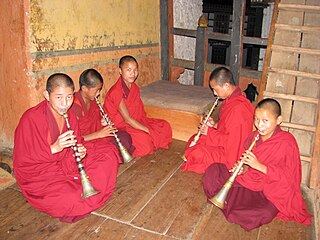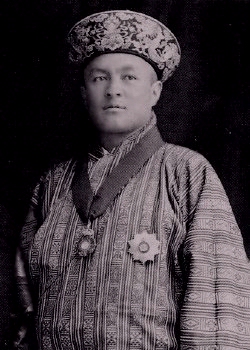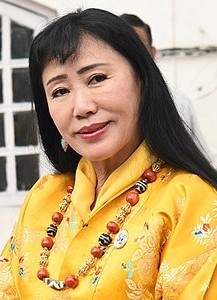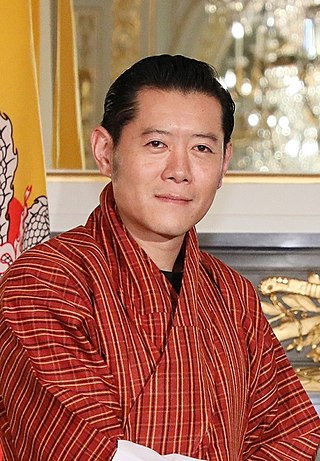Related Research Articles

The music of Bhutan is an integral part of its culture and plays a leading role in transmitting social values. Traditional Bhutanese music includes a spectrum of subgenres, ranging from folk to religious song and music. Some genres of traditional Bhutanese music intertwine vocals, instrumentation, and theatre and dance, while others are mainly vocal or instrumental. The much older traditional genres are distinguished from modern popular music such as rigsar.

Jigme Wangchuck was the 2nd Druk Gyalpo or king of Bhutan from 26 August 1926, until his death. He pursued legal and infrastructural reform during his reign. Bhutan continued to maintain almost complete isolation from the outside world during this period; its only foreign relations were with the British Raj in India, under which Bhutan was a protected state. He was succeeded by his son, Jigme Dorji Wangchuck.

The Royal Bhutan Army is a branch of the armed forces of the Kingdom of Bhutan responsible for maintaining the country's territorial integrity and sovereignty against security threats. The Druk Gyalpo is the Supreme Commander in Chief of the RBA. The Chief Operations Officer is Goonglon Gongma Batoo Tshering.
Zhungdra is one of two main styles of traditional Bhutanese folk music, the other being bödra. Arising in the 17th century, zhungdra is an entirely endemic Bhutanese style associated with the folk music of the central valleys of Paro, Thimphu, and Punakha, the heart of the Ngalop cultural area. Bödra, in contrast, evolved out of Tibetan court music.
Boedra is a traditional genre of Bhutanese music. Boedra, which is influenced by Tibetan folk music, is one of the two main folk singing styles in Bhutan, the other being zhungdra, which was developed in the 17th century.

Rigsar is a music genre, the dominant type of popular music of Bhutan. It was originally played on a dranyen, and dates back to the late 1960s. The first rigsar song, Zhendi Migo was a copy of the popular Bollywood filmi song "Sayonara" from the film Love in Tokyo. Rigsar songs can be in several languages, including the Tshangla (Sharchopkha) language.
DashoLhendup Dorji was a member of the Dorji family of Bhutan. He was also the brother of the Queen of Bhutan, Ashi Kesang choden and uncle to the fourth king of Bhutan, King Jigme Singye Wangchuck. He served as acting Lyonchen following the assassination of his brother, Lyonchen Jigme Palden Dorji, on April 5, 1964.

Princess Sonam Dechen Wangchuck is a princess of Bhutan. She is the daughter of the Fourth King of Bhutan Jigme Singye Wangchuck and Queen Mother Dorji Wangmo Wangchuck. She is half-sister of the fifth King, Jigme Khesar Namgyel Wangchuck.

A staple of Bhutanese cuisine is Bhutanese red rice, which is like brown rice in texture, but has a nutty taste. It is the only variety of rice that grows at high altitudes. Other staples include buckwheat and increasingly maize.

Dorji Wangmo is the Queen Mother of Bhutan, and first wife of former king Jigme Singye Wangchuck, who is married to four sisters all of whom were entitled to be called queen.

Sangay Choden is one of the four wives and queens of Bhutanese king Jigme Singye Wangchuck, who ruled in Bhutan from 1972 until his abdication in 2006. She is the Queen Mother of Bhutan.

The Druk Gyalpo is the head of state of the Kingdom of Bhutan. In the Dzongkha language, Bhutan is known as Drukyul which translates as "The Land of the Thunder Dragon". Thus, while kings of Bhutan are known as Druk Gyalpo, the Bhutanese people call themselves the Drukpa, meaning "people of Druk (Bhutan)".
Soksom is a traditional Bhutanese sport. It involves throwing a javelin at a distance of 20 metres (66 ft).
Khuru is a traditional Bhutanese sport. It involves throwing darts outdoors with a target approximately 15–20 metres (49–66 ft). A short segment of the BBC TV programme 'Lost Land of the Tiger', filmed at a village game in the southeast of the country, implies the following features:
Pundo is a traditional Bhutanese sport. It is a game played by laymen and consists of throwing a stone weighing over a kilo as far as possible. The throwing movement is from the shoulder, with the stone held flat in the hand.

A wonju is a long-sleeved blouse worn by women in Bhutan. Made of silk, polyester, or lightweight cotton, it is worn underneath the Kira, part of the national costume under the driglam namzha.

The lakes of Bhutan comprise its glacial lakes and its natural mountain lakes. Bhutanese territory contains some 2,674 high altitude glacial lakes and subsidiary lakes, out of which 25 pose a risk of GLOFs. There are also more than 59 natural non-glacial lakes in Bhutan, covering about 4,250 hectares (16.4 sq mi). Most are located above an altitude of 3,500 metres (11,500 ft), and most have no permanent human settlements nearby, though many are used for grazing yaks and may have scattered temporary settlements.
Dasho is a Bhutanese honorific that is bestowed upon individuals, along with a red scarf kabney, by the Druk Gyalpo. In common practice, however, many senior government officials and social elites are addressed as Dasho without officially receiving the title and the red scarf kabney.
Princess AshiDechen Yangzom Wangchuck is the daughter of the fourth King of Bhutan Jigme Singye Wangchuck and his wife, Queen Mother Ashi Tshering Yangdon Wangchuck. She is the sister of the fifth King, Jigme Khesar Namgyel Wangchuck.

Ashi Pema Dechen (1918–1991) was the queen consort of Bhutan.
References
- ↑ "༈ རྫོང་ཁ་ཨིང་ལིཤ་ཤན་སྦྱར་ཚིག་མཛོད། ༼ཨ༽" [Dzongkha-English Dictionary: "A"]. Dzongkha-English Online Dictionary. Dzongkha Development Commission, Government of Bhutan. Archived from the original on 2011-08-25. Retrieved 2011-10-23.
- ↑ "༈ རྫོང་ཁ་ཨིང་ལིཤ་ཤན་སྦྱར་ཚིག་མཛོད། ༼དྲ༽" [Dzongkha-English Dictionary: "DRA"]. Dzongkha-English Online Dictionary. Dzongkha Development Commission, Government of Bhutan. Archived from the original on 2011-08-25. Retrieved 2011-10-23.
- ↑ "Tibetan-English-Dictionary of Buddhist Teaching & Practice". Diamond Way Buddhism Worldwide. Rangjung Yeshe Translations & Publications. 1996. Archived from the original on 2010-03-28. Retrieved 2010-10-18. (entry: drag shos)
- ↑ Dema, Kinga (2011-02-21). "Golden Jubilee Celebration Concludes". Kuensel online. Archived from the original on 2012-06-14. Retrieved 2011-10-28.
- ↑ "Treasures of the Thunder Dragon: A Portrait of Bhutan". Written by Ashi Dorji Wangmo Wangchuck, Queen Ashi Dorji Wangmo Wangchuck (Consort of Jigme Singye Wangchuck, King of Bhutan)